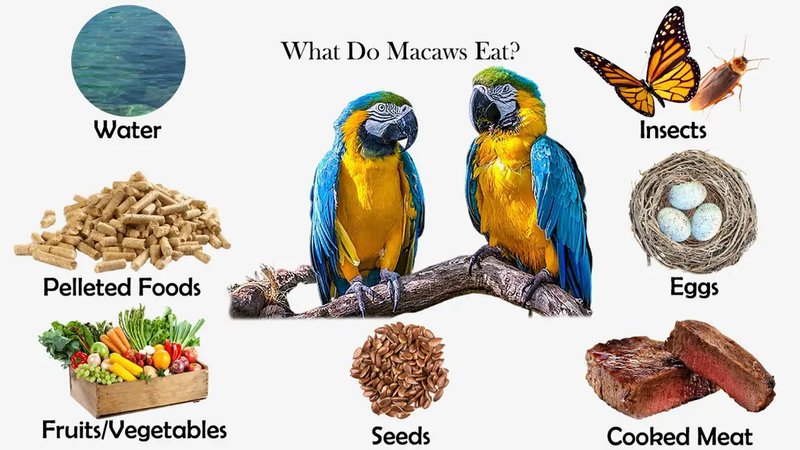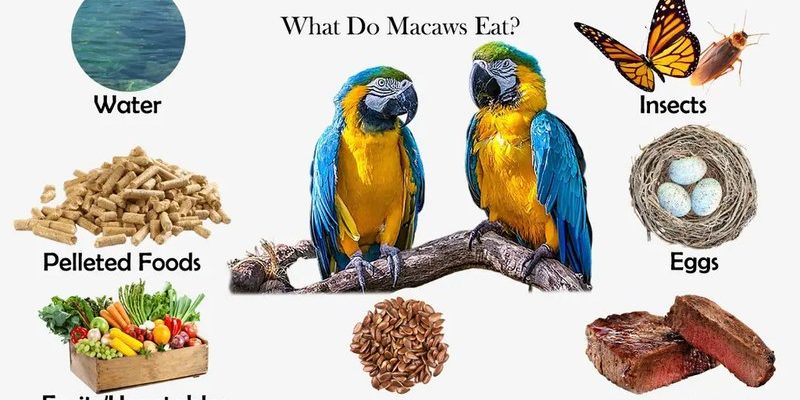
You might be wondering, “What exactly do macaws eat, and how often should they be fed?” You’re in the right place! In this guide, we’ll break down everything you need to know about a macaw’s diet, including their favorite foods, a feeding schedule, and the best practices to ensure they thrive. Let’s dive into the world of macaw meals, one bite at a time.
Understanding the Macaw’s Natural Diet
Macaws are native to Central and South America, where they thrive in lush rainforests, savannas, and woodlands. In the wild, these birds have a diverse diet that helps them stay healthy and strong. Typically, they feast on a mix of fruits, nuts, seeds, and even some flowers and leaves. Think of it like a colorful buffet filled with all sorts of goodies!
Fruits: Macaws love fruits like bananas, papayas, and mangoes. These sweet treats are not just tasty but also rich in vitamins and antioxidants, crucial for keeping their immune system in tip-top shape.
Nuts and Seeds: Nuts are a staple in a macaw’s diet. They particularly enjoy almonds, walnuts, and Brazil nuts. These not only provide essential fatty acids but also satisfy their natural urge to forage.
Vegetables: Fresh, crunchy veggies can be a delightful addition. Things like carrots, sweet potatoes, and leafy greens (like kale) not only give a nutrient boost but also keep their beaks busy.
When thinking about feeding your macaw, remember that variety is key. A mix of these food types keeps your feathered friend happy and healthy!
Best Foods for Macaws
While macaws can eat a wide range of foods, not everything is created equal. Here are some excellent choices to keep in mind when planning their meals:
- Pellets: A high-quality pelleted diet is often recommended as a base food. Make sure it’s specifically formulated for macaws, as they contain the necessary nutrients tailored to their needs.
- Fresh Fruits: Always opt for organic fruits when possible and wash them thoroughly. A slice of apple or a few berries can go a long way!
- Nuts: You can offer unsalted nuts regularly, but keep the amounts moderate to avoid weight gain.
- Vegetables: Include a mix of cooked and raw vegetables to provide different textures and flavors. Roasted sweet potatoes can be a favorite!
- Legumes: Cooked beans and lentils can be excellent protein sources and are rich in fiber.
It’s easy to get overwhelmed with choices, but honestly, keeping it varied while ensuring nutritional balance is the best approach. You wouldn’t want a diet that consists of just one kind of food, right? Your macaw feels the same!
Feeding Schedule for Macaws
Now that you have an idea of what to feed your macaw, let’s talk about when to feed them. A consistent feeding schedule helps maintain their health and wellbeing.
Morning: Offer about 75% of their daily food in the morning. This could include pellets, a variety of fruits, and fresh veggies. Starting the day with a hearty breakfast keeps their energy levels up and keeps them motivated to play.
Afternoon: A small snack in the afternoon can help sustain their energy throughout the day. This could be a few nuts or a piece of fruit. Think of it as a mid-afternoon pick-me-up!
Evening: By evening, they might be more interested in socializing or relaxing. Offer them a light meal, perhaps some veggies or a small portion of pellets. This helps ease them into the night.
You might be wondering about the right portion sizes. As a rule of thumb, aim for about ¼ cup of pellets per day per macaw, supplemented by fresh foods. Monitor their weight and adjust portions accordingly.
Nutritional Needs of Macaws
Understanding the nutritional needs of your macaw can feel like deciphering a secret code, but it’s really about balance. They have specific dietary requirements you’ll want to keep in mind.
Protein: Macaws need protein for muscle health. Pellets and legumes are excellent sources. Just remember, a little goes a long way—too much protein can be harmful.
Fats: Healthy fats from nuts provide essential fatty acids. However, since fat is calorie-dense, moderation is necessary, especially for less active birds.
Carbohydrates: Fruits and whole grains offer carbohydrates that can boost energy, but cutting back on sugary fruits and opting for high-fiber veggies is wise.
Vitamins and Minerals: Vitamins A, D, and calcium are huge for macaws. Dark leafy greens and orange fruits can help meet these needs. You might also consider a bird-safe multivitamin if you’re unsure they’re getting everything they need from their diet.
Balancing these nutritional aspects is key to keeping your macaw vibrant and full of life!
Foods to Avoid
While there’s a long list of foods that macaws can enjoy, there are just as many that should be avoided. Some foods can be toxic or harmful to your feathered friend. Here’s a quick rundown:
- Avocado: It contains a compound called persin, which can be toxic.
- Chocolate: A definite no-no! Chocolate is poisonous to many animals, including birds.
- Caffeine: Avoid coffee, tea, or anything with caffeine; it can lead to hyperactivity and health issues.
- Processed Foods: Anything high in sugar, salt, or artificial additives should stay far away from your macaw’s dish.
When in doubt, it’s best to research any new foods you want to introduce. Keeping your macaw safe and healthy is always the priority!
Creating a Balanced Diet for Your Macaw
To create a balanced diet for your macaw, think of it as crafting a rainbow of foods on their plate. You want to include a mix that covers all their nutritional bases.
Daily Variety: Aim to rotate different fruits, vegetables, and nuts throughout the week. Just like you might enjoy different meals, your macaw will appreciate variety.
Keep it Fresh: Always serve fresh foods, and be mindful of spoilage. Remove any uneaten fresh items from their cage to prevent mold and bacteria growth.
Monitor Health: Keep an eye on your macaw’s weight and overall health. If you notice changes in their behavior or weight, it might be time to adjust their diet.
Creating a balanced diet is more than just about feeding them; it’s about nurturing their body and spirit. A happy macaw is one that thrives on good nutrition!
Feeding your macaw might sound like a task, but when you understand their needs and preferences, it turns into an enjoyable routine. Think of it as an opportunity to bond with your feathered friend over a colorful plate of nourishing goodies. By providing a balanced diet rich in fruits, vegetables, nuts, and quality pellets, you’re not just filling their belly; you’re promoting a healthy, happy life.
So, the next time you’re at the store or thinking about meal prep for your macaw, remember the vibrant buffet of possibilities. Your macaw’s wellbeing starts with you, and with a little care, you can ensure they flourish for years to come!

